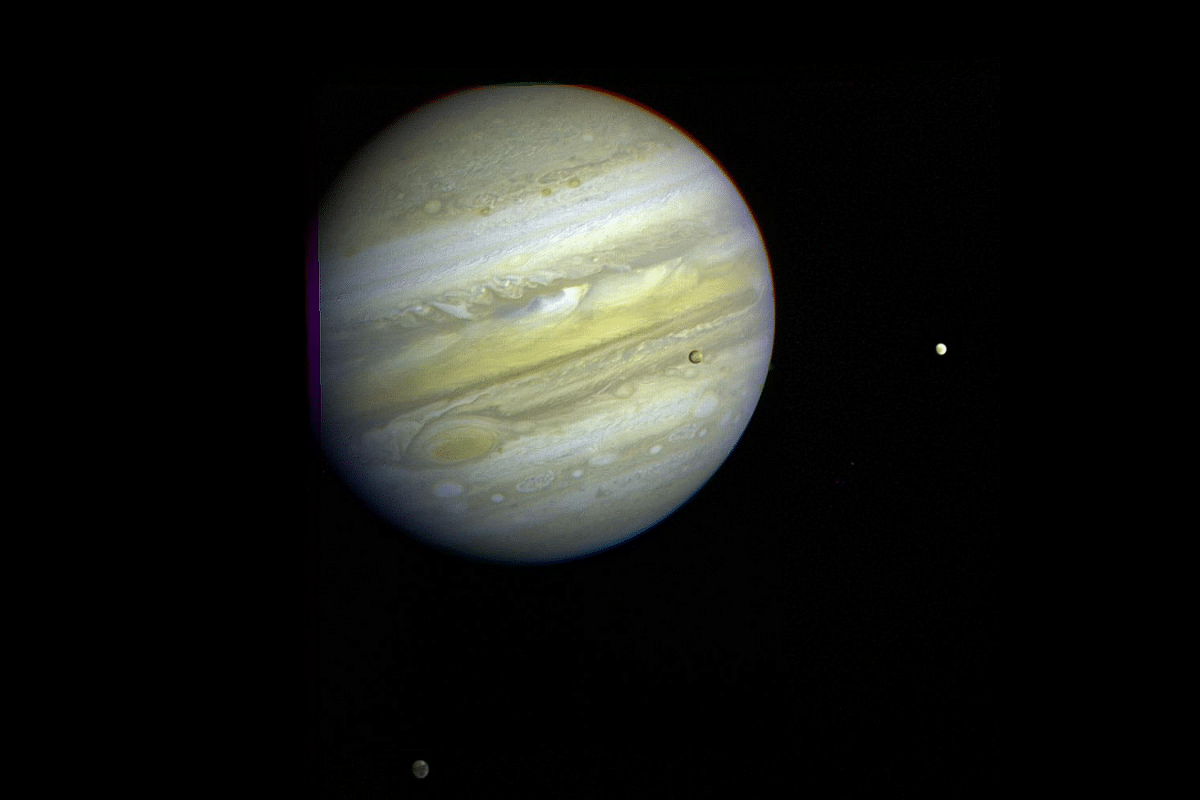Science
Something Crashed Into Jupiter On Tuesday; Astronomers Trying To Figure Out What Exactly
- Amateur astronomers have caught a huge explosion from an impact on Jupiter.
- Follow-up observations may present a clearer picture of this impact event.

Jupiter and Three Galilean Satellites. Photo taken 5 February 1979 by Voyager 1 spacecraft. (Source: NASA/JPL)
Something — and astronomers aren’t sure what it was yet — smacked into Jupiter on 13 September, producing a bright impact flash.
Fortunately, some here witnessed it.
The light on the biggest planet in the Solar System was captured by José Luis Pereira, an amateur astronomer from Brazil.
In his picture of the special event, Pereira has stated the time and date of the impact as approximately 22:39:30 Universal Time on 13 September 2021 (about 5.39 am in Indian Standard Time on 14 September 2021).
The image was processed by French planetary observer and imaging specialist Marc Delcroix.
The observation is said to have been made under bad weather conditions and the recorded video was put through “DeTeCt”, a software tool developed by Delcroix to catch planetary impacts.
Twitter account “ESA Operations”, belonging to the European Space Agency, took note of the observation. “Not a lot of info on the impacting object yet but its likely to be large and/or fast!” a tweet said, thanking Jupiter for its “planetary defence”.
By virtue of its large size — Jupiter is so big that more than 1,300 earths could fit inside it — the gas giant that is more than twice as massive as all the other planets combined, takes hits from large and rapidly flying objects in space. In the process, it protects its small planetary neighbours, among them Earth.
Whether this strike has left an atmospheric scar on Jupiter will be revealed by follow-up observations.
For now, at least two other amateur astronomers, Harald Paleske in Germany and Jean-Paul Arnould in France, have confirmed the 13 September Jupiter impact.
The capture by members of Société Lorraine d'Astronomie, Arnould among them, using a 62 cm F/15 telescope from the Astroqueyras observatory in St-Véran, France, aligns with the date and time specified by Pereira.
Before this, a Jupiter impact flash was observed on 7 August 2019 at 4.07 Universal Time, detected by astrophotographer Ethan Chappel.
Going further back in time, impact flashes were observed in the years 2017, 2016, 2012, 2010, and 2009, as noted in Italian amateur astronomer Ernesto Guido’s blog about comets and asteroids.
Perhaps, the most famous of the hits taken by Jupiter was by the comet Shoemaker-Levy 9, named after its discoverers Eugene and Carolyn Shoemaker and David Levy.
The comet had gotten too close for comfort to the gas giant, only to then be shredded by tidal forces resulting from Jupiter’s gravity.
The resulting pieces of the comet went around the planet for about two years until they smashed into it at about 60 kilometres per second in 1994, producing several impacts captured most prominently by the Galileo orbiter of the National Aeronautics and Space Administration (NASA).
According to NASA, the impacts left “dark, ringed scars” that remained for almost a year before being swept away by Jupiter's winds.
Carolyn Shoemaker passed away just last month, on 13 August 2021, with her co-discoverer Levy writing her obituary for the journal Nature.
In his piece, Levy recalls a reporter asking Carolyn what would happen if the comet’s fragments were to hit Earth instead, to which she initially responded, “We would all die.”
Thank goodness for Jupiter!
Support Swarajya's 50 Ground Reports Project & Sponsor A Story
Every general election Swarajya does a 50 ground reports project.
Aimed only at serious readers and those who appreciate the nuances of political undercurrents, the project provides a sense of India's electoral landscape. As you know, these reports are produced after considerable investment of travel, time and effort on the ground.
This time too we've kicked off the project in style and have covered over 30 constituencies already. If you're someone who appreciates such work and have enjoyed our coverage please consider sponsoring a ground report for just Rs 2999 to Rs 19,999 - it goes a long way in helping us produce more quality reportage.
You can also back this project by becoming a subscriber for as little as Rs 999 - so do click on this links and choose a plan that suits you and back us.
Click below to contribute.
Latest